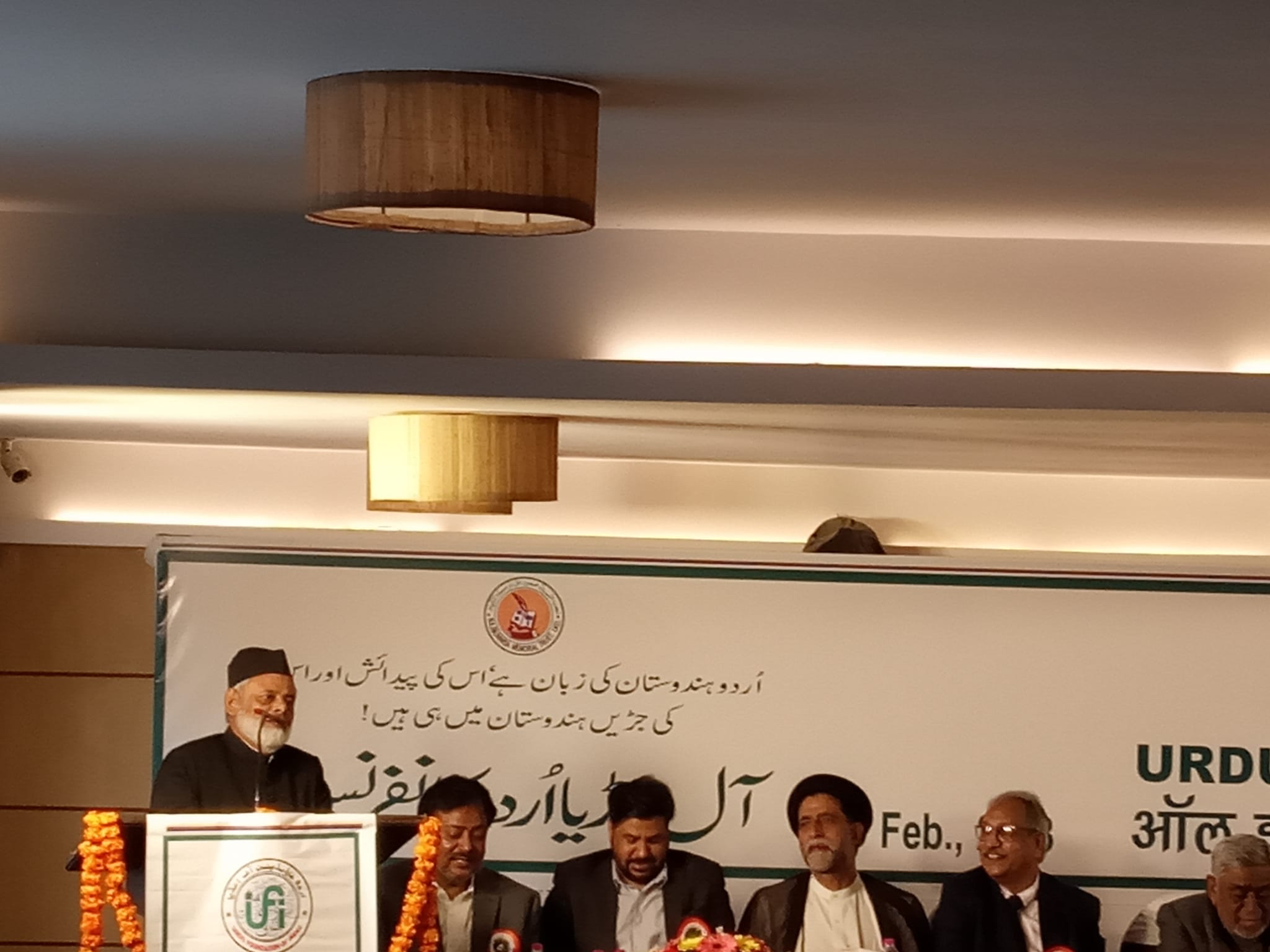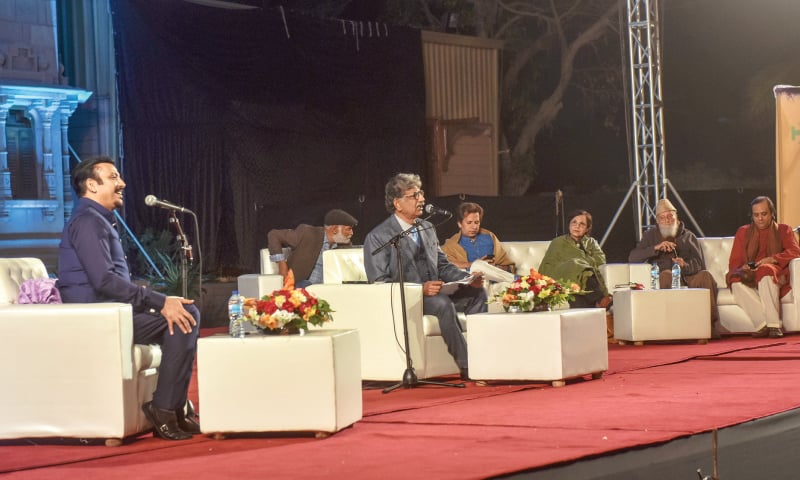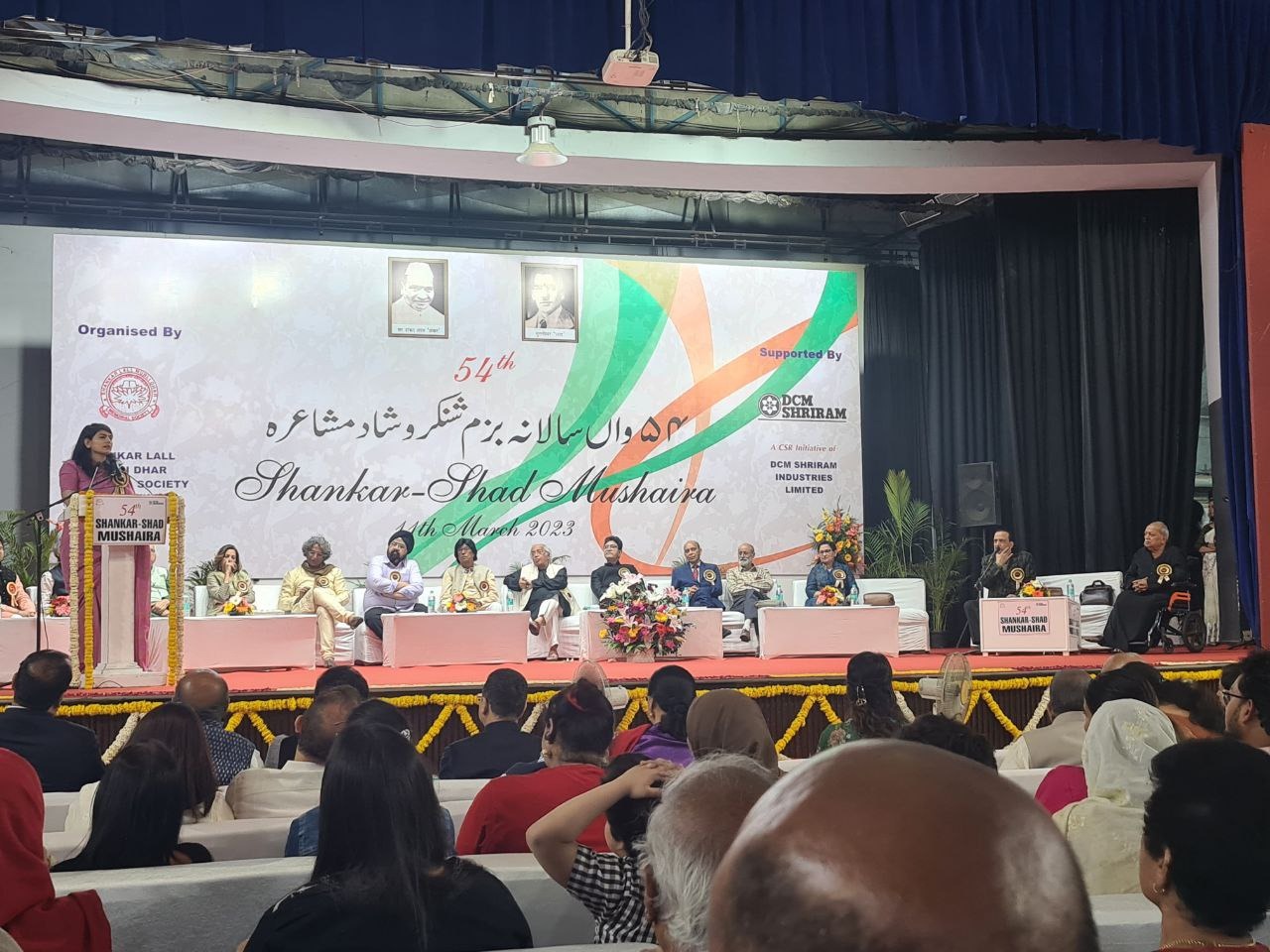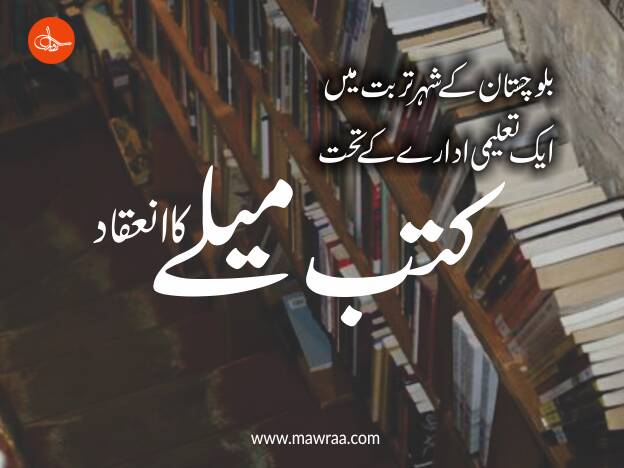All India Urdu Conference was organized by the Fakhrul-Deen Ali Ahmad Memorial Committee in collaboration with the Urdu Foundation of India and the Najb-ul-Nissa Memorial Trust, under the supervision of Professor Abbas Raza Naqvi. The conference began with a recitation of the Holy Quran by Hafiz Abu Zafer Siddiqui. Special guests at the conference included Chairman Torg Zaidi of the Fakhrul-Deen Ali Ahmad Memorial Committee, Chairman Maulana Khalid Rashid of the Islamic Center of India, and Maulana Dr. Yasub Abbas.
All India Urdu Conference was held on Urdu issues different scholars and professors from various universities and institutions discussed the current state of Urdu and its development. Professor Safdar Imam Qadri highlighted one of the biggest challenges facing Urdu: the lack of a public institution where people can come together to address its issues.
According to Professor Qadri, there is minimal communication between Urdu departments in universities and colleges. He emphasized the critical role that Urdu departments in universities could play in promoting the language. He called for raising our voices for our rights, especially if the government reduces the budget for official institutions such as Urdu academies and the National Council for Promotion of Urdu Language.
Moreover, Professor Qadri in All India Urdu Conference expressed concern about the weak leadership in Urdu departments in universities and colleges, with creative writers and critics emerging mostly from universities.
Professor Akhtarul Wasey addressed the audience at a presidential speech and stated that the Urdu language is not limited to the scope of schools in Lucknow and Delhi. He emphasized that without the support of governments, no language can survive, and for the promotion of Urdu, the people themselves need to make an effort. Chairman of the Fakhrul Islam Ali Memorial Committee, Tauraj Zaidi promised the Malik Muhammad Jayasi Award. Meanwhile, Professor Sharib Rudaulvi stated that human mentality has left Urdu behind, but societies can establish associations to keep the language alive.
Abdul Majid Nizami, editor and group editor of the daily National Sahara, stated that as long as there is hope and motivation within us, the Urdu language cannot die. He urged everyone to fulfill their responsibility by buying Urdu newspapers and media outlets to keep the language alive. Professor Khwaja Iqramuddin of JNU stated that Urdu is the language that represents Indian culture and civilization. It is the fastest-growing language in the world and the language of connection. Professor Saroj Ajmali of AMU stated that during the preparation of the new educational policy, the deficiency in communication skills was felt, which highlighted the importance of Urdu as a medium of communication.
Professor Shamsul Haq Siddiqui from Hyderabad presented a detailed overview in All India Urdu Conference, of Urdu literary activities in Deccan, stating that Urdu is taught in Telangana using the Nawayath and Kendriya dialects. Renowned critic Haqqani Al-Qasmi said that languages do not survive on emotional speeches alone, but practical actions are necessary. Senior journalist Masoom Muradabadi said that there is no movement to save the Urdu language, and any language cannot survive without its script. Dr. Janki Prasad from Delhi said that the services of Muslims in the Urdu language and literature are evident. It is not necessary to prove this. The promotion of Urdu language and literature strengthens the roots of democracy. Syed Abbas Rizvi from Kashmir said that we need to make efforts to promote Urdu ourselves. He said that Lucknow is the center of Urdu language.
Senior journalist Sahil Anjum from Voice of America said in All India Urdu Conference that the number of newspapers and journals is decreasing, which is surprising, and if language and expression issues are resolved, Urdu can benefit greatly from social media. Mustafa Ali Khan, a Hindi literature expert, said that Urdu is our mother tongue and is spoken in our homes. It is difficult to save it if it is removed from our homes. Darul Uloom Nadwatul Ulama Lucknow’s senior professor, Maulana Alaudin Nadvi, said that the problem of Urdu language is the survival of the nation, and literature is not a fundamental necessity of every human being, but language has a fundamental importance. Maulana Fazil Nasrani said that Urdu is the language of both Muslims and Hindus, and its promotion is everyone’s responsibility.
کانفرنس کا اہتمام اردو فاؤنڈیشن آف انڈیا اور نجب النسا میموریل ٹرسٹ کے زیر اہتمام فخرالدین علی احمد میموریل کمیٹی، لکھنؤ کے اشتراک سے کیاگیا تھا۔ کانفرنس کی نظامت پروفیسر عباس رضا نیر نے کی۔ کانفرنس کا آغاز حافظ ابوظفر صدیقی کی تلاوت کلام پاک سے ہوا۔ کانفرنس میں فخرالدین علی احمد میموریل کمیٹی کے چیئرمین تورج زیدی اور اسلامک سنٹر آف انڈیا کے چیئرمین مولانا خالد رشید فرنگی محلی اور مولاناڈاکٹر یعسوب عباس نے بطور مہمان خصوصی شرکت کی۔
ایک طویل عرصے کے بعد اردو کے مسائل پر ایک نمائندہ کانفرنس منعقد کی گئی جس میں ملک کی مختلف ریاستوں اور اہم یونیورسٹیوں کے پروفیسرز اور دانشوروں نے شرکت کی . اردو کی موجودہ صورت حال اور اس کی ترقی کے لئے لائحہ عمل کے تعلق سے اپنے خیالات کا اظہار کیا ۔عارف کیسل ہوٹل میں منعقد آل انڈیا اردو کانفرنس میں اپنے کلیدی خطبے میں پروفیسر صفدر امام قادری نے کہا کہ اردو کے مسائل میں سے ایک بڑا مسئلہ یہ ہے کہ اس کا کوئی عوامی ادارہ نہیں ہے، جہاں ہم سب مل بیٹھ کر اس کے مسائل کو حل کر سکیں۔
پروفیسر صفدر امام قادری نے کہا کہ یونیورسٹیز اور کالجوں کے شعبہ اردو میں رابطہ کی بہت کمی ہے۔ اردو کے فروغ میں یونیورسٹیوں کے اردو شعبوں کو کلیدی کردار ادا کرنا چاہئے۔انھوں نے زور دے کر کہا کہ اپنے حق کے لئے ہمیں اپنی آواز بھی بلند کرنی چاہئے۔ سرکاری اداروں، اردو اکیڈمیوں، قومی کونسل برائے فروغ اردو زبان کے بجٹ میں اگرحکومت کمی کرے تو ہمیں ایک ساتھ آواز اٹھانی چاہئے۔ انہوں نے افسوس ظاۃر کرتے ہوئے کہا کہ یونیورسٹیوں اورکالجوں کے شعبہ اردو کی لیڈر شپ کمزور ہورہی ہے۔یونیورسٹیوں سے تخلیق کارکم اور نقاد و محقق زیادہ نکل رہے ہیں۔
پروفیسر سراج اجملی خطاب کرتے ہوئے پدم شری پروفیسر اختر الواسع نے صدارتی خطاب میں کہاکہ اردو کا منظر نامہ وہ نہیں ہے جو دبستان لکھنو اور دبستان دہلی کا ہے۔ انھوں نے کہا کہ سرکاروں کے سہارے کوئی بھی زبان کب تک زندہ رہ سکتی ہے۔اردو کے فروغ کے لئے عوام کو خود کوشش کرنی ہوگی۔ فخرالدین علی احمد میموریل کمیٹی کے چیئرمین تورج زیدی نے ملک محمد جائسی ایوارڈ کا وعدہ کیا۔ پروفیسر شارب رودولوی نے کہا کہ انسانی ذہنیت ہی اردو زبان کو پیچھے لے گئی۔ انھوں نے کہاکہ اردو کی بقا کے لیے ہم انجمنیں قائم کر کے اردو کو زندہ رکھ سکتے ہیں۔
روزنامہ راشٹریہ سہارا کے ایڈیٹر اینڈ گروپ ایڈیٹر عبدالماجد نظامی نے کہا کہ اردو زبان اس وقت تک نہیں مر سکتی جب تک ہماری امید اور حوصلہ نہیں مرتا۔ انھوں نے کہا کہ ہم سب کی یہ ذمہ داری ہے کہ اردد اخبارات ورسائل کو خرید کر ضرورپڑھیں، تبھی ہم اردو کو باقی رکھ سکتے ہیں۔
جے این یو کے پروفیسر خواجہ اکرام الدین نے کہا کہ ہندوستان کی تہذیب و ثقافت نے جس زبان کو وجود بخشا وہ صرف اور صرف اردو ہے۔ اردو رابطے کی زبان ہے اور دنیا میں سب سے تیزی سے مقبول ہونے والی زبان ہے، اے ایم یو کے پروفیسر سراج اجملی نے کہا کہ نئی تعلیمی پالیسی کے بعد اردو نصاب کی تیاری کے دوران رابطہ کی کمی کو بہت محسوس کیا گیا۔
، حیدرآباد کے پروفیسر شمس الہدیٰ نے دکن میں اردو کی ادبی سرگرمیوں کا تفصیلی جائزہ پیش کیا۔ انھوں نے کہا کہ نوودے ودیالیہ اور کیندریہ ودیالیہ کے طرز پر تلنگانہ میں اردو پڑھائی جاتی ہے۔ معروف نقاد حقانی القاسمی نے کہا کہ زبانیں جذباتی نعروں سے زندہ نہیں رہتیں بلکہ اس کے لیے عملی اقدامات ضروری ہیں۔ سینئر صحافی معصوم مرادآبادی نے کہا کہ اردو زبان کو بچانے کے لیے کوئی تحریک بچی ہی نہیں ہے۔ کسی بھی زبان کو اس کے رسم الخط کے بغیر زندہ نہیں رکھا جاسکتا۔
ڈاکٹر جانکی پرساد (دہلی)نے کہا کہ اردو زبان و ادب میں مسلمانوں کی خدمات اظہر من الشمس ہیں۔ یہ کوئی ثابت کرنے والی چیز نہیں ہے۔ اردو زبان و ادب کا فروغ جمہوریت کی جڑوں کو مضبوط کرتا ہے۔ سید عباس رضوی (کشمیر) نے کہا کہ اردو کو فروغ دینے کے لئے ہمیں خود کوشش کرنی ہوگی۔ انھوں نے کہا کہ لکھنؤ اردو زبان کی راجدھانی ہے۔ سینئر صحافی وائس آف امریکہ کے سہیل انجم نے کہا کہ اخباروں اور رسالوں کی تعداد میں کمی ہوتی جارہی ہےجو باعث حیرت ہے، زبان وبیان کی خرابیاں اگر دور ہوجائیں تو سوشل میڈیا سے اردو کو بہت فائدہ پہنچایا جاسکتا ہے۔
مصطفی علی خاں ادیب الہندی نے کہا کہ اردو ہماری مادری زبان ہے، اور ہمارے گھروں میں بولی جاتی ہے۔ اگر یہ گھروں سے چلی جائے تو اسے بچانا مشکل ہے۔ دارالعلوم ندوۃ العلماء لکھنؤ کے سینئر استاد مولانا علاؤالدین ندوی نے کہا کہ اردو زبان کا مسئلہ قوم کی بقا کا ہے ، ادب ہر انسان کی بنیادی ضرورت نہیں ہے لیکن زبان بنیادی حیثیت رکھتی ہے۔ مولانا فضیل ناصری (دیوبند) نے ہندوستان کے مدارس میں اردو کا تعلیمی نظام، کالی کٹ یونیورسٹی کیرالہ کے پروفیسر مبین الحق نے کیرالہ میں اردو کی صورت حال، ڈاکٹر حسان نگرامی نے طبیہ کالجوں میں اردو کی صورت حال، اے ایم یو کے ڈاکٹر قمر عالم نے مشترکہ ہندوستانی تہذیب شاعری کے حوالے سے اور مولانا محمد توصیف عالم نے بہار میں اردو کا منظرنامہ موضوع پر سیر حاصل گفتگو کی۔ مہدی حسن نے اظہار تشکر کیا۔ اس موقع پر پرویز ملک زادہ، سید عاصم رضا، سہیل وحید،ضرغام الدین، اویس سنبھلی، نثاراحمد،محمد سعید اختر، مجتبیٰ حسن صدیقی، مشکور عالم، احرار الحق، مولانا مطیع الرحمن عوف ندوی، مفتی منور سلطان ندوی، شاہد حبیب فلاحی، محمد مظہر الحق، ڈاکٹر شبنم رضوی، رفیع احمد، محمد جاوید اختر، ضیاء اللہ صدیقی، ڈاکٹر عبدالقدوس ہاشمی، ڈاکٹر مسیح الدین خاں، ڈاکٹر ریشماں پروین، ڈاکٹر نزہت پروین، ریسرچ اسکالر صائمہ ثمرین، ڈاکٹر جاں نثار، تبسم فاروقی، ڈاکٹر سلیم ملک، قاری رضی الدین، مولانا نوراللہ،محمد عمران خان، حافظ دانش قمر، مصباح الہدیٰ،کاشف رضا، قیصر رضا، قمرالزماں ندوی، مفتی محمد علی نعیم رازی،محمد فیروز ایڈوکیٹ، رفیع احمد سمیت سیکڑوں محبان اردو موجود رہے۔





